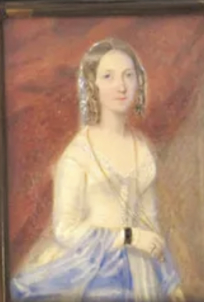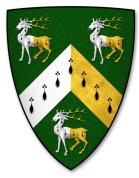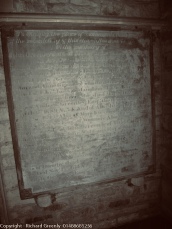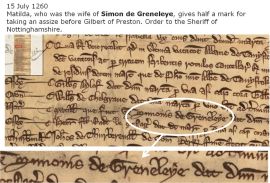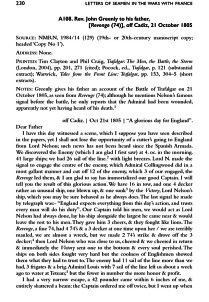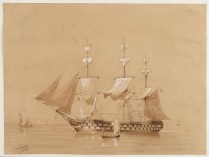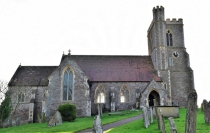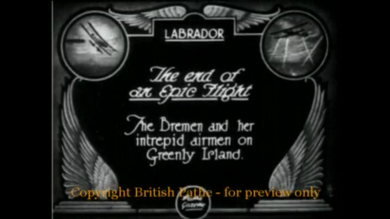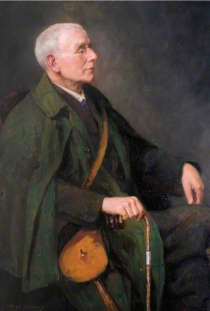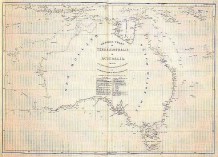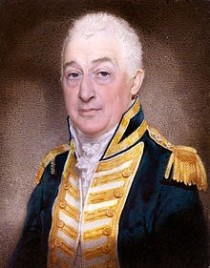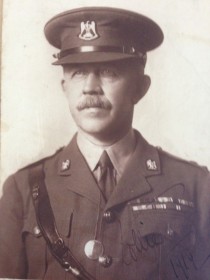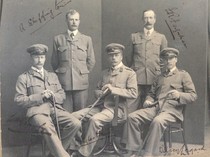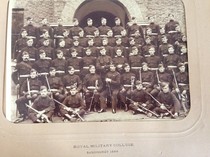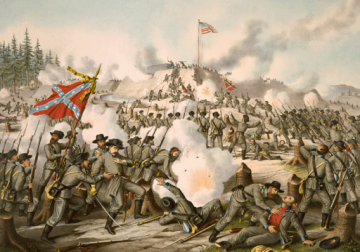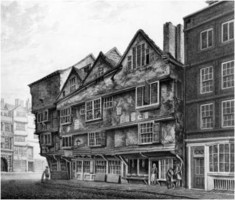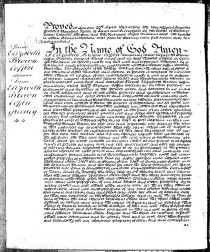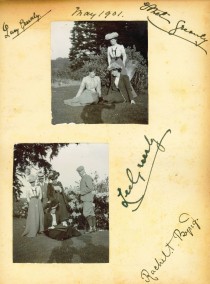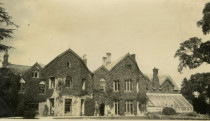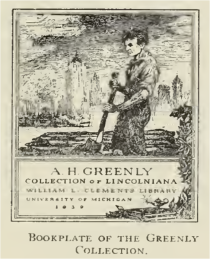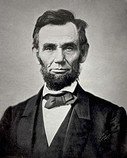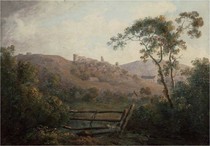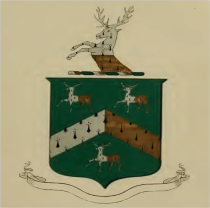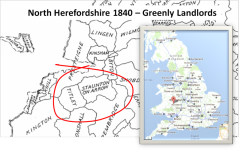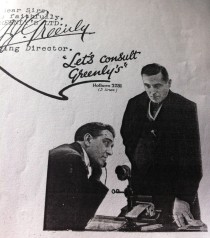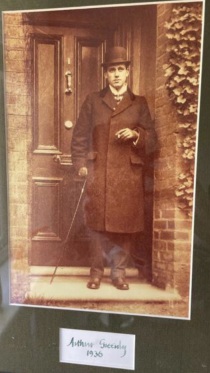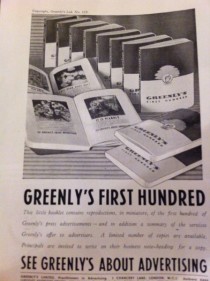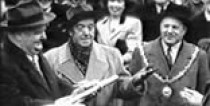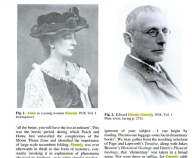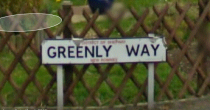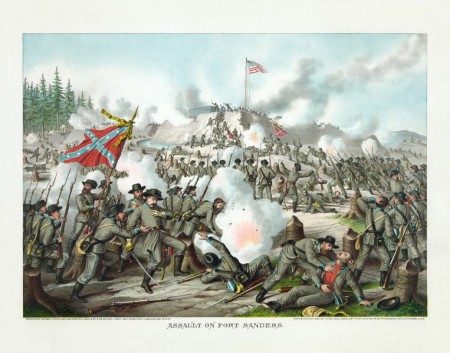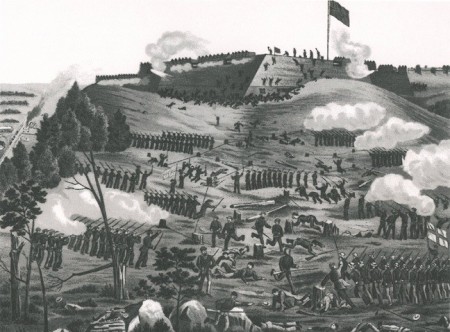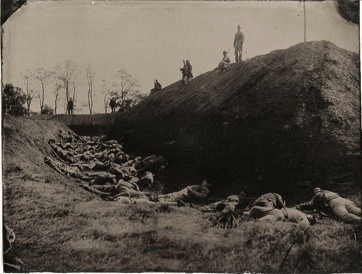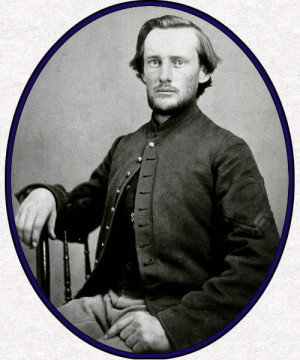Corporal John Watkins (Ancestor of John Greenly, Born 1683, of Herefordshire)
John Greenly was born in Herefordshire on 1 April 1683. He married Ann Coleman on 24 June 1709. John and Ann had 8 children. One of these children, Mary, married Stephen Watkins at Staunton on Arrow on 29 April 1738. Mary and Stephen had a son, John, who married Elizabeth Smythe in Staunton on Arrow on 14 April 1774.
John and Elizabeth emigrated to America. They had a son, George. John Watkins was born to George and Mary (Cook) Watkins in Cleveland, Ohio on January 24, 1840. He enlisted in the 19th Ohio Light Artillery on August 9, 1862 as a Private and was eventually promoted to Corporal. The unit participated in the Siege of Knoxville and the Atlanta Campaign before mustering out at Camp Cleveland, Ohio on June 27, 1865. After the war ended, Watkins married Sarah Victoria Probert (1841-1916) and the couple had five children: Mary (Watkins) Mills (1868-1898), Eliza "Tinnie" (1873-1960), Cornelia "Corla" (Watkins) Crosier (1877-1931), Louis Greble (1879-1951), and Emma Frances (1881-1932). Both Mary and Tinnie attended Oberlin College and became school teachers in Ohio. John Watkins died of heart disease on November 23, 1924 in Pittsfield, Ohio and is buried in South Pittsfield Cemetery.
John Watkins is the author of these letters.
I am directly related to this John as the Mary that married Stephen Watkins was the sister of John Greenly (born 1718) who is my Great, Great, Great, Great Grandfather.
"...ON THEY CAME WITH A YELL...."
One Man's View of the Battle of Fort Sanders
An article commemorating the 125th anniversary
of the Battle of Fort Sanders
One hundred and twenty-five years ago this month (1863) two armies clashed on a hill northwest of Knoxville in an extremely short, ferocious action known as the Battle of Fort Sanders. To commemorate this anniversary, a view from the trenches seems appropriate. A look at Civil War Knoxville, as well as the Battle, is provided by an Ohio corporal in letters discovered in the University of Tennessee Special Collections Library.
In a September 1863 letter, Corporal John Watkins of the 19th Ohio Battery describes Knoxville to his fiancé, Sarah: "Knoxville must have been quite a place before the war began, but it looks now as though it was the oldest place in the world and been allowed to run down ever since it was built...." He also mentions that Knoxville had contained a Confederate conscript camp where the conscripts had to be confined "in order to hold them."
Writing to a friend in mid-December, he states, "on the 20th [November] there was hardly any firing till dark then the rebels got another battery in position fired 4 or 5 times throwing shell clear over the town and bursting 200 feet high. On the 21st it rained most all day and no fighting. The rebels had got clear round us from the river on the west side of the town to the river on the east side of town." In the same letter the corporal tells of a "sortie" made on November 24th by members of the 2nd Michigan to the Rebel rifle pits in front of the fort. After the 2nd was repulsed, a truce was called to retrieve the wounded, "then you ought to have seen the rebel brutes rush out of the pits and strip the dead. Oh if I ever felt like taking a man’s hearts blood, it was them devils. And right in plain sight to [sic]."
On the night of November 28th, Confederates in front of Fort Sanders drove in the Federal pickets. The Federal artillery in the fort began firing in response and, according to Watkins, fired all night. In the frigid dawn of Sunday morning, November 29th, the expected Confederate assault came as 4,000 of Gen. Lafayette McLaws' veterans stormed up the hill.
"...soon after daylight they opened on us from all their batteries or at least 5 positions and if the shell didn't fly around us I am no judge. The air was full of bursting shell but the most of them to [sic] high. I don't think that there was a man killed in the 3/4 of an hour that they shelled us and but one wounded and he was right beside us in a tent.... I was standing up against the breastwork and saw the shell coming just as plain as day. We could hear them coming before they got anywhere near us and what a noise they make.
While this shelling was going on the rebels were forming for a charge on the fort and the first our folks new [sic] of them they were within 20 yards of the picket line and less than 300 from the point of the fort. And on they came with a yell 3 columns deep and one in reserve...the rebels came over logs, wire, and stumps and planted there [sic] colors right on the outer slope of the fort. The slope there is on an angle of 45 degrees and about 20 feet from the top of the work down to the top of the ditch. Then the ditch is about 7 feet wide and 6 deep.
They just piled in there on top of one another dead wounded and dying and the living to get away from the fire of our troops. One of them got up to one of the embrasures with some 4 or 5 behind him in front of a piece that has 3 charges of canisters in it, and he hawed right out and says surrender you yankee sons of bitches. The words were hardly out of his mouth before the piece was pulled off and away went Mr. Reb and companions blown into ribons [sic].
But all of this did not last more than half an hour for those that were alive in the ditches began to call for quarters and the order was given to cease firing.... There was an arrangement made right off to cease hostilities till 7 o'clock in the evening.
As soon as the firing stopped I went up and got on the parapet to look at them. And such a sight I never saw before nor do I care about seeing again. The ditch in places was almost full of them piled one on top of the other.... They were brave men. Most of them were Georgians. I would give one of the wounded a drink as quick as anybody if I had it. That is about the only thing they ask for when first wounded. But at the same time I wished the whole Southern Confederacy was in that ditch in the same predicament.
After Knoxville, John Watkins served with Sherman through the Atlanta campaign and then served with Thomas at Nashville. At War's end, Watkins returned to Ohio where he married his Sarah.
However, in 1895 he was once again in Knoxville for a reunion of the 19th Ohio Battery. Two letters written to Sarah at home give us an interesting insight into his visit.
We went out to the Armstrong house I spoke about. We were a little doubtful about our receipt... [but we were] escorted into the parlor to sit and rest awhile...showed us every room in the house. Showed us all the bullet-holes and shell marks...showed us where his guns were placed on either side of the house, also where some men were killed on both sides, rebel and Federal and where buried in her yard. We were also on the spot where General Sanders was shot about 80 rods from her house.
And....
Went to Fort Sanders, looked the place over and talked with old soldiers and some other people about it, but it will soon be of the past -- boys are helping to tear down the parapets to find bullets and they get lots of them.... We can locate the place where our gun stood all right, now there is a big house built within 100 feet of it and a road is graded right through the works between where we were.
John Watkins was born to English emigrants George and Mary (Cook) Watkins in Cleveland, Ohio on January 24, 1840. He enlisted in the 19th Ohio Light Artillery on August 9, 1862 as a Private and was eventually promoted to Corporal. The unit participated in the Siege of Knoxville and the Atlanta Campaign before mustering out at Camp Cleveland, Ohio on June 27, 1865. After the war ended, Watkins married Sarah Victoria Probert (1841-1916) and the couple had five children: Mary (Watkins) Mills (1868-1898), Eliza "Tinnie" (1873-1960), Cornelia "Corla" (Watkins) Crosier (1877-1931), Louis Greble (1879-1951), and Emma Frances (1881-1932). Both Mary and Tinnie attended Oberlin College and became school teachers in Ohio. John Watkins died of heart disease on November 23, 1924 in Pittsfield, Ohio and is buried in South Pittsfield Cemetery.
Sept 18th 1863
Mr. George W. Probert
Pittsfield Swain
Co, Ohio
Knoxville Tennessee Sept 18th 1863
My own dear Sarah
Well darling it is a long time since I have written to you, and I have no doubt but what you will begin to think by the time you this that there is surely something the matter with me, or else I have entirely forgotten you. if you have got the last letter that I wrote to you you will see by that where we were going, and have some kind of an idea of what the chances are here to send letters, after they are written. the Battery has been here nearly two weeks and have not had any mail yet from home. and for my part I begin to feel as though we had got where we will never here from home again.
our march across the mountains was a long and very hard one both for man and beast. we left Crab Orchard, Ky. the 21st of Aug and that was about the last we saw of civilized life till we were within about 25 miles of Knoxville. the roads began to get pretty hilly after we left Somerset and kept growing worse all the while till we got most through. and Sunday the 23 of Aug we crossed the Cumberland river quite a swift and wide stream and where we forded about 2 1/2 or 3 feet deep and a solid rock bottom, and covered over with loose stones the water was very clear. but here it seemed as though our hard work had jest began. for the hill to go up from the river was very near 1 1/2 miles long and in some places so steep, rocky and crooked that it looked almost impossible to get up at all. but by taking plenty of time and putting 10 horses on each piece and casson we got up. that was about all we done that day was to get over the river. we went into camp and stayed till the
next day about noon waiting for the baggage train to cross so that we could all move off together as much
as possible. they were all day Sunday and that night and the next day crossing the river and when we started from camp there was 4 or 500 wagons to come over. I heard it said that there was about
1000 wagons in the train. we generally got up in pretty good season to march and some of the time got into camp for the night in pretty good season. in the evening of the 25th of Aug I got a letter
from you, and I tell you, although it was short it done me a good deal of good to hear from you away off there in the wilderness, for we marched through the woods most all the time after we crossed
the Cumberland, only once in a great while that we passed a house. on the 26 we crossed the line into Tennessee. we had inquired for a number of miles where the line was and the folks told us how we
would know when we came to it. there was a large square stone stuck up on one side of the road so plain that we could not help but see it; all along, there was plenty of pine timber and in some
places plenty of cedar, and no end to the rocks both above and below the surface of the ground along there and for two or three days after while we were on top of hose hills the air was very clear
and cool. on the 31st of Aug, we marched through a town at the foot of the mountains called Montgomery some 4 or 5 houses in it that were inhabited and as many more that were empty. on the 1st of
Sept we drew 8 days rations to carry with us and the next day started for Knoxville about 2 oclock and marched till midnight. on the 3d of Sept crossed the Clinch river by fording. that was a very
clear stream and about 3 feet deep where we crossed and a rock bottom
on the 4th of Sept we encamped outside of Knoxville having marched that day 22 miles. on the 5th we left camp and marched through town and went into camp again. the rebels have held this place ever since the war began, and I dont see why they did not try to hold the place. they had thrown up breastworks on two or three hills and that is about all they did do for they were all gone before our Cavalry came into the place. here they had a conscript camp that they confined there conscripts in so as to hold them. Knoxville must have been quite a place before the war began but it looks now as though it was the oldest place in the world and been allowed to run down ever since it was built. the rebels have driven all the union people most out of the place and stripped them of most everything. there has been 4 men hung here for there loyalty to the union and h of them put into prison. we are encamped on quite a hill a little peace out of town, but I can see hills all around us that are a good deal higher, and some that are pretty near big enough to be mountains, that must be 30 or 40 miles off. on the Sunday the 6th of Sept we stayed in camp all day and the most that I rember of doing that day was to sleep. on the morning of the 7th the section that I belong to was called up about 2 oclock and at 4 we started out of camp with 3 days rations of hard bread and 1 of salt meat. when we started up we did not know where we were going but finally found out that it was Cumberland Gap 60 miles from Knoxville. we were 2 1/2 days going there. we got there in the forenoon of the 10th and expected to have a fight at that place sure, but were again disappointed for they surrendered about 1/2 past 3 the same day that we got there. the troops that went with us were the 44th & the 104th Ohio regiments and the 4th Ohio Battery and our section. Gen'l Burnside himself went along with us. he got there early in the morning the same day that we got there and gave them till 3 oclock that afternoon to make there minds which they would do fight or surrender and they finally saw fit to give the place up. there was quite a force of Cavalry there ahead of us and a force on the other side of the Gap from us that had come in from Ky the nearest way. but it seems the reason they did not show any fight here was because they had to many conscripts and North Carolina soldiers that wouldnt fight to risk a battle and have to loose the place after all. about 4 oclock Burnside and all the mounted force on the side that we were and the 104th regiment marched up to take possession of the place. I have never seen the official report of the number of prisoners but have heard there was about 2500 of them and 12 pieces of artillery. you have no doubt heard of it long before this. the nearest that I was to the Gap was about 3 miles, but to look straight across to the Gap from where we were it did not seem more than a mile. the mountains on each side of the Gap are very high and the Gap is only wide enough for 1 wagon to go along at a time, and consequently very easy to defend. two pieces of Artillery could sweep all the forces that could be sent against out of existence in a little while. and the hills on each side of the Gap look as though it would almost be impossible to get up. the timber is all cut off of them and the tops of them look pretty bare, most all bare rock to I guess. with a few thousand determined men well provisioned in that Gap I dont see how any force are a going to take them it is almost impossible to do it as long as they have plenty of provisions. on the 11th we left camp on our return to Knoxville. and when we started we had 8 or 9 mules hitched on to the two pieces in the place of horses that had given out and gone. the first day going back we marched 15 miles and a little while before we put up for the night. we went through a place called Tazewell of about 200 population, a year ago in November the rebels burned 36 houses in the place and I tell you the place looks pretty hard now. we got back into camp in Knoxville monday forenoon the 14th of Sept. and there is no mistake about it I am glad of it for a little rest will be very exceptable. on tuesday morning we had an inspection in camp, and that Evening all the troops were marched down town to see a fellow belonging to Wolfords Cavalry drumed before his regiment and all the rest with 1/2 of his head shaved his hands tied behind him and a large placard pined on his breast with the word thief printed on it in large letters, for robbing a house and then setting it on fire, and besides all that he is sent to Johnsons Island for the rest of his term of service without pay. that is a pretty severe punishment. yesterday I did not do much of anything but lay down and rest myself a little. some of the time it is very warm. yesterday it was uncomfortable warm in the shade and doing nothing at that, and today it is uncomfortable without plenty of clothes on. it rained a little last night and it turned around quite cool and has been cloudy all day. oh darling it is a long time since I have heard from you and it may be a long time yet before I get a letter from you. and another thing I dont know when this can be got away from here for there is no established mail yet. if I could only here from some of you at home, how glad I should be, and how happy I should be to hear that my darling was well and had been since I last heard from her. we have had a long and hard march since we left Lexington. it must be 170 or 180 miles the way we came from here to Lexington and then our section went to the Gap and back making 120 miles more. now I think it is no more than fare if they let us stay here and get a good rest.
Sunday Sept 20th
darling one I did not have time to finish the letter up on friday. I put it by calculating to finish it yesterday, but come to find out we had to move camp in the morning over to the west side of the town and there we stayed till after dinner, and then we had to move camp again the last time into the woods, first clearing out the brush. and now we have got a pretty nice little camp and I hope they will let us stay here a little while. I was so busy that I could not get a chance to write any yesterday. but oh Sarah I did think of you pretty often. we are now encamped about 60 rods from the river Holston. it carries this name for 25 miles and then from there the Tennessee. it is a pretty wide stream and pretty clear water. it is navigable for small stern wheel boats for 30 miles above here I believe. when I commenced writing this I had not the best idea when I should get a chance to send it off. but this morning I have heard that there is a mail to leave here tomorrow morning early. and we have got to have it ready by 3 oclock this afternoon to leave camp. and so I concluded that I would take right hold and write this morning what I had to write for darling I have no doubt but that you are anxiously waiting and looking for a letter every day. I know I should like to hear from you first rate, but there is no telling when any mail will come here. and still it seems as though they might have a mail coming through now the Gap is open, & as soon as they get the railroad clear between here and Chattanooga we had ought to have mail pretty regular and once more get full rations. now we get niether sugar or coffee salt meat. the supply trains have got delayed somewhere and the Commissary department is pretty near cleaned out, and it has been so dry here that vegetables are not very fleshy potatoes are selling for $1 a bushel onions $2 butter 25 cts, sugar in town is worth 65 cts, a pound, but this is nothing to what they did ask for stuff when we came here (in Confederate money boots were selling for $40 a pair, ladies shoes $30 and other stuff in proportion.) the same boots are now selling for $10 a pair in our money. that I call a pretty good price for a pair of common cowhide boots. while the rebels were here they did not draw any Government rations, but lived on the country. they would go to a union man's house and take the very best things he had in the world and walk off without a word. and the best thing he could do was to keep still. oh I tell you what Sarah I have been glad a hundred times that we lived so north as we do for I think that a much greater curse could not happen to any section of country than to have an army pass through it, whether hostile or not. for they strip everything on there route. orchards potatoes patches cornfields and eat the people out of house and home. I know I have thought a great many times that if an army ever went through a country where I lived I would shut up house and go into the woods to live. I dont know but what I am getting so much written here that you will never read the whole of it. but there is no telling when I shall get a chance to send you another letter. but I will write to you as often as I can Sarah, wheather I write to any of the rest or not, and if I have time I will write to the rest of the folks occasionally. remember me to the boys all of them and your father and mother especially. I wish Sarah I could hear from you as often as I did in Kentucky I would be satisfied. and I dont know but what I shall have to be anyhow. I wish that I could be up there this morning for jest a little whiles. I would like to walk around with you and get some aples. there is plenty of apples in this coutnry but all they are fit for is to make cider. there is hardly any good fruit, and I never saw corn grow so tall in my life as some I have seen here but if only I could be where I could have a good long talk with you this morning Sarah, I should like it first rate, but when such another chance as that comes around again I guess it will be for good for I dont expect to get home now till this war is over.
darling I hope this will find you well. I am as well as usual and have been since I wrote to you last. I must close now hoping soon to hear from you, and remaining still as truly devoted to you as ever. John
direct to Knoxville Tennessee care of Capt Joe C. Shields 19th Ohio Battery


